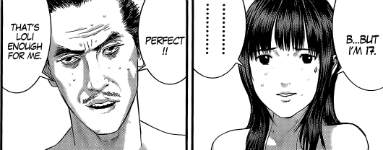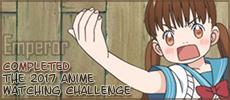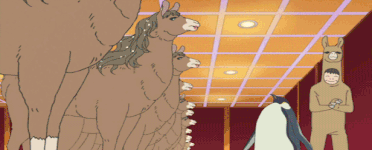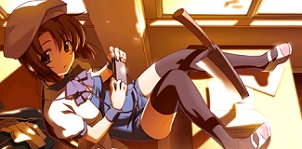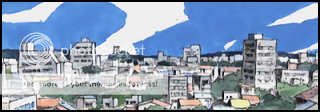Shrackner said:
Still fumbling around for thoughts in my head, but I think I've somewhat grasped what's going on. As the show suggests, I'll interpret these weird chain of events as a result of Shigemaru's loneliness along with what the show suggested in the earlier episode, as a fall to decadence and a rebirth into salvation.
I think this arc somewhat similar to the last couple episodes of "No Longer Human." Shigemaru, like Yozou, has deep-rooted problems in dealing with other human beings. We can see this through his willingness to seclude himself within the isolated mountains and his fear of cherry blossoms. Viewing cherry blossoms is traditionally a social event that one shares with company, but in his case, the blossoms become a physical trigger to remind him of his lack of human interaction and—at the same time—his longing to establish such connections.
One can only stay secluded for so long. Borrowing the mentioned phrase now, we see how he descends into “decadence” through his continued stay in the mountains, in which he begins to lose sense of reality, morality, and identity the more time he spends alone. I believe his conjurations of his “wives” are a development from this, in which he attempts to create imaginations to keep himself sane and functioning. With this in mind, we can partially explain the strange and exaggerated “humor” of the show. As a result of his degradation, reality begins to blur as we’re thrown into his messy mind.
As his time alone lengthens, he can only fall further down the shitcan. More and more of his imaginations (wives) pop up to keep him surrounded, even to the point of a talking boar making an appearance, but these are not enough for him. Eventually, I think what could be called as “salvation” makes her appearance in the form of Akiko. He unconditionally obeys her and falls madly in love with her, and she, in her duty as “salvation” tries to save him from seclusion and bring him to the people of the city.
By the end of episode 1, we’ve run into a somewhat strange scene, with him killing off his former wives. I think contextually, if we treat them as past imaginations, it makes sense for him to see them merely as old, boring attractions in comparison to his newest revelation. It wouldn’t seem that strange then for him to decide to get rid of them, as brutal as the scene may entail. In their replacement, he follows Akiko to the city of people, a subconscious attempt to save and rebuild himself.
But obviously, things don’t go well. He’s very awkward, very suspicious, “shy,” and strained with the people in the city. He can’t even hold a conversation with them, so he tries something else. He begins collecting heads for himself, playing with said heads in an effort to change himself. But he never reaches salvation completely. Eventually, his fascination with Akiko fades away, and he asks her to return back to seclusion with him.
As he makes his final trek back, the cherry blossoms return once again, triggering another reaction. He realizes the unspeakable horrors and the painful loneliness he suffers, understands that Akiko is a mere imagination, and sees herself and himself as a barbaric demon. Now this ending is quite interesting. Of course, what ends here is definitely no salvation for Shigemaru. He’s gone way off the deep-end, returning back to his secluded self, but at the very least, it’s fair to say that he’s definitely changed. At his last breath he’s able to realize his pitiful faults and horrific behaviors. He’s able to reestablish a sense of morality and bring himself back to reality. But in a sad twist of fate, he trades in his life to do so.
This is along the lines of what the story is actually about. The large majority of the posts here just don't get it at all. Read between the lines people. These are classics of Japanese literature; allegory, satire, and symbolism shouldn't be unexpected. |

















